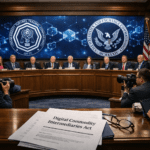Custodia Master Account Ruling: Appeals Court Backs Fed Authority
Recently, the U.S. Tenth Circuit Court of Appeals confirmed that the Federal Reserve had the right to refuse Custodia Bank a master account and thus resolved at least one question in favour of central bank practices. This is a major development in the crypto banking industry and confirms that the mere fact that an institution meets the criteria for an account does not entitle it to one. Located in Wyoming, Custodia Bank was set up as a Special Purpose Depository Institution (SPDI) to marry traditional finance with digital assets. It applied for a master account in 2020 but the Federal Reserve Bank of Kansas City turned it down in January 2023. The bank then sued, arguing that all eligible candidates must be allowed a master account under federal law. But both the district court and now the appeals court disagreed, concluding that the Federal Reserve has discretion to turn someone down if it considers the applicant a risk or inappropriate. The federal reserve’s decisions in 1979 and 1980 authorized amendments to Regulation D, the implementing rules for the membership and operation of central bank accounts and national check clearing systems. But on the district court level Custodia argued that the word “shall” in laws governing access to accounts meant that the Fed had to approve any depository institution meeting eligibility requirements.
The court though sought to emphasize that “may” as opposed to “shall” was the operative word and ultimately sided with the Fed’s contention it had the scope to assess each application on grounds of potential systemic risk. It ruled that Custodia, although it does indeed qualify as a depository institution, is not automatically entitled to a master account. Instead, the Federal Reserve can reject applications that might add to the threat of financial instability or raise compliance risks, especially those associated with cryptocurrencies whose operations are too unpredictable or incompletely regulated.
In the US financial system, a master account is a virtual ATM card: inside are the keys to getting money into and out of banks more quickly than anyone else. It gives banks and savings associations direct access to speedy wire transfers, check clearing centers for Federal Reserve bank districts, regular clearinghouses or settlement networks like Fedwire®. Without such an account, a bank will have to work via another bank, which pushes up costs. The process also pales in speed of execution compared with that achieved by a bank using its master account to wire money directly from one of the twelve Federal Reserve banks around the nation. As for Custodia, the denial means it cannot operate independently within the US payment system and must rely on traditional banks for settlement a troublesome contradiction to the vision painted by part of its model as being a blockchain-integrated financial system. Custodia had expressed hope that co-owner Mark Liu (an Australian-trained lawyer who had hoped to provide a “platform” of interest) would see some of this occur under NEWORIENT’s business license.
By itself, spokesman Eric Finnegan notes wistfully, Custodia cannot.Members of the Tenth Circuit upheld the decision, following a similar one this past summer. The Kansas City Federal Reserve said it was concerned about Custodia’s extensive exposure to crypto related activities, which struck them as too risky for direct participation in their network. The appeals court agreed, reasoning that safeguarding the payment system’s overall integrity is part of the Fed’s supervisory duties.
The logical conclusion is that it serves public interest.Crypto-oriented financial institutions are hereby informed that innovation must follow the principles of prudent risk management. It strengthens the role of the Federal Reserve as gatekeeper for financial stability a crypto friendly banking license like Wyoming’s SPDI is not automatically entitled to a master account in the Federal Reserve.
This ruling means that for fintech and digital asset businesses, compliance, transparency, and strong risk frameworks before coming through the Fed are more important things to note than ever. While Custodia can still take its case to the Supreme Court, the existing law within the Tenth Circuit underlines that the Federal Reserve has the right to reject applicants on the grounds of discretion and safety. In essence,the court’s decision strikes a balance between innovation and prudence reiterating to the sector that being approved for banking is not an entitlement, but a right to direct access to the Fed’s financial tracks must be earned, not considered automatic.






















